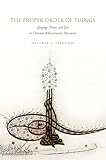The proper order of things : language, power, and law in Ottoman administrative discourses / Heather L. Ferguson.
Material type: TextPublisher: Stanford, California : Stanford University Press, 2018Description: 1 online resourceContent type:
TextPublisher: Stanford, California : Stanford University Press, 2018Description: 1 online resourceContent type: - text
- computer
- online resource
- 9781503605534
- 1503605531
- Turkey -- History -- Ottoman Empire, 1288-1918
- Discourse analysis -- Political aspects -- Turkey -- History
- Order -- Political aspects -- Turkey -- History
- Administrative law -- Turkey -- History
- Turkey -- Politics and government
- Imperialism
- Empire ottoman -- Histoire
- Empire ottoman -- Politique et gouvernement
- Impérialisme
- HISTORY -- Middle East -- General
- HISTORY -- Middle East -- Turkey & Ottoman Empire
- Administrative law
- Discourse analysis -- Political aspects
- Imperialism
- Politics and government
- Turkey
- 1288-1918
- 956/.015 23
- DR486
| Item type | Home library | Collection | Call number | Materials specified | Status | Date due | Barcode | |
|---|---|---|---|---|---|---|---|---|
 Electronic-Books
Electronic-Books
|
OPJGU Sonepat- Campus | E-Books EBSCO | Available |
Online resource; title from PDF title page (EBSCO, viewed July 30, 2018).
Includes bibliographical references and index.
Introduction : the structure of empire and a grammar of rule -- The sovereign state : spatial and textual politics in early modern Eurasian courts -- The state of stability : the kanunname as a genre of administrative governance -- The bureaucratic state : reforming documentary practices -- The brokered state : "the past is no longer the present" in the "land between the rivers" -- A state of rebellion : the re-territorialization of Ottoman sovereignty in greater Syria -- On the perfect state : an Ottoman vision of order -- Conclusion : the archiving state.
The "natural order of the state" was an early modern mania for the Ottoman Empire. In a time of profound and pervasive imperial transformation, the ideals of stability, proper order, and social harmony were integral to the legitimization of Ottoman power. And as Ottoman territory grew, so too did its network of written texts: a web of sultanic edicts, aimed at defining and supplementing imperial authority in the empire's disparate provinces. With this book, Heather L. Ferguson studies how this textual empire created a unique vision of Ottoman legal and social order, and how the Ottoman ruling elite, via sword and pen, articulated a claim to universal sovereignty that subverted internal challengers and external rivals. The Proper Order of Things offers the story of an empire, at once familiar and strange, told through the shifting written vocabularies of power deployed by the Ottomans in their quest to thrive within a competitive early modern environment. Ferguson transcends the question of what these documents said, revealing instead how their formulation of the "proper order of things" configured the state itself. Through this textual authority, she argues, Ottoman writers ensured the durability of their empire, creating the principles of organization on which Ottoman statecraft and authority came to rest. -- Provided by publisher
eBooks on EBSCOhost EBSCO eBook Subscription Academic Collection - Worldwide
There are no comments on this title.

